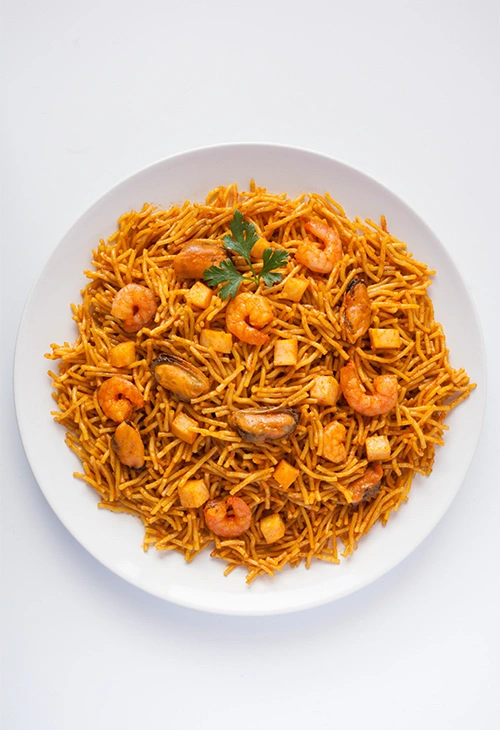

Top Health Benefits of Fideuà You Need to Know
Seafood Fideuà is a nutrient-rich dish that combines the wholesome goodness of lean seafood proteins, complex carbohydrates, and heart-healthy fats. The inclusion of shrimp, mussels, and squid provides an excellent source of high-quality protein, omega-3 fatty acids, and important micronutrients such as vitamin B12, zinc, iodine, and selenium, all of which are essential for brain function, immunity, and thyroid health. The use of extra virgin olive oil contributes healthy monounsaturated fats that support cardiovascular well-being. Tomatoes, garlic, and onions offer antioxidants like lycopene and allicin, which have anti-inflammatory and immune-boosting effects. Although the pasta adds carbohydrates, it also provides energy, making this dish a balanced option when consumed in moderation. Overall, Seafood Fideuà delivers a flavorful, satisfying meal with a rich nutritional profile.
Recipe :
For 4 people
Enjoy your traditional Spanish Fideuà — rich in flavor, seafood, and Mediterranean charm!
When preparing Seafood Fideuà, it's important to toast the noodles in olive oil before adding any liquid, as this enhances their flavor and prevents them from becoming mushy. Using a good-quality fish stock (or seafood broth) is essential to infuse the noodles with deep, savory flavor; water or plain broth will produce a less vibrant result. Timing is crucial—overcooking the seafood can lead to a rubbery texture, so it should be added at the right moment to ensure tenderness. The consistency of the dish should be fairly dry, unlike soupy pastas, so avoid excess liquid. Letting the Fideuà rest for a few minutes after cooking allows the flavors to meld and the noodles to finish absorbing any remaining broth. Using a wide, shallow pan (like a paella pan) helps the noodles cook evenly and develop a slightly crispy bottom layer known as “socarrat”, which is considered a delicacy.

Seafood Fideuà fits well into the Mediterranean diet due to its use of olive oil, seafood, and vegetables, all of which promote heart health and longevity. It is also appropriate for pescatarians and those following a high-protein eating plan. However, it is not suitable for individuals following ketogenic, paleo, gluten-free, vegan, or vegetarian diets, as it contains pasta made from wheat and various animal-derived ingredients. Those on a low-calorie diet should watch portion sizes, as the olive oil and pasta can increase the calorie count quickly. For those with shellfish allergies or sodium restrictions (like individuals following the DASH diet), this dish may need to be modified or avoided entirely. Substituting whole wheat or gluten-free pasta, and reducing added salt or choosing low-sodium broth, can help make the dish more adaptable to specific dietary needs.
...